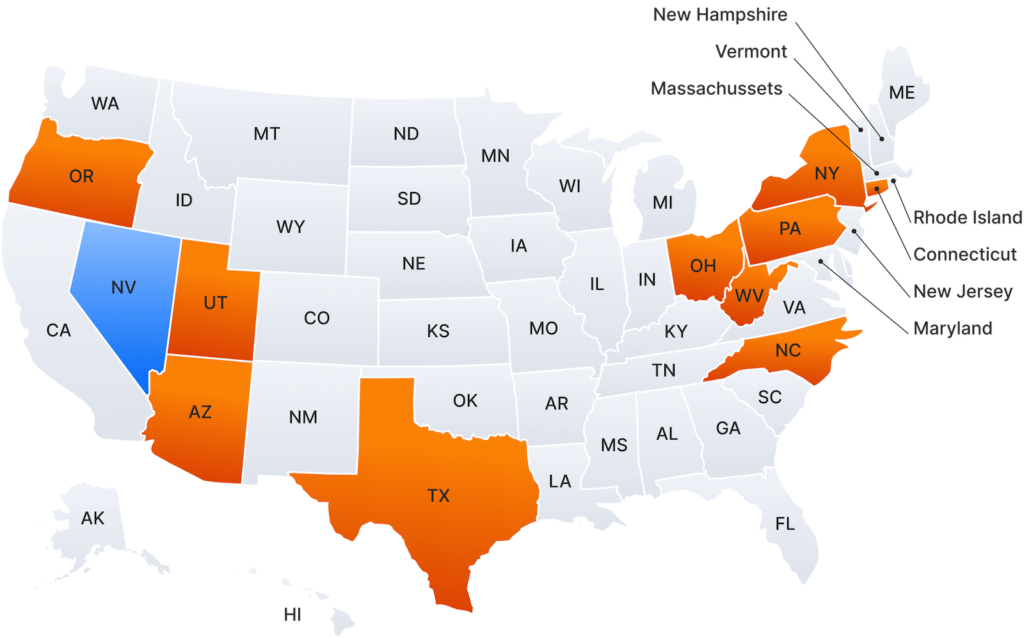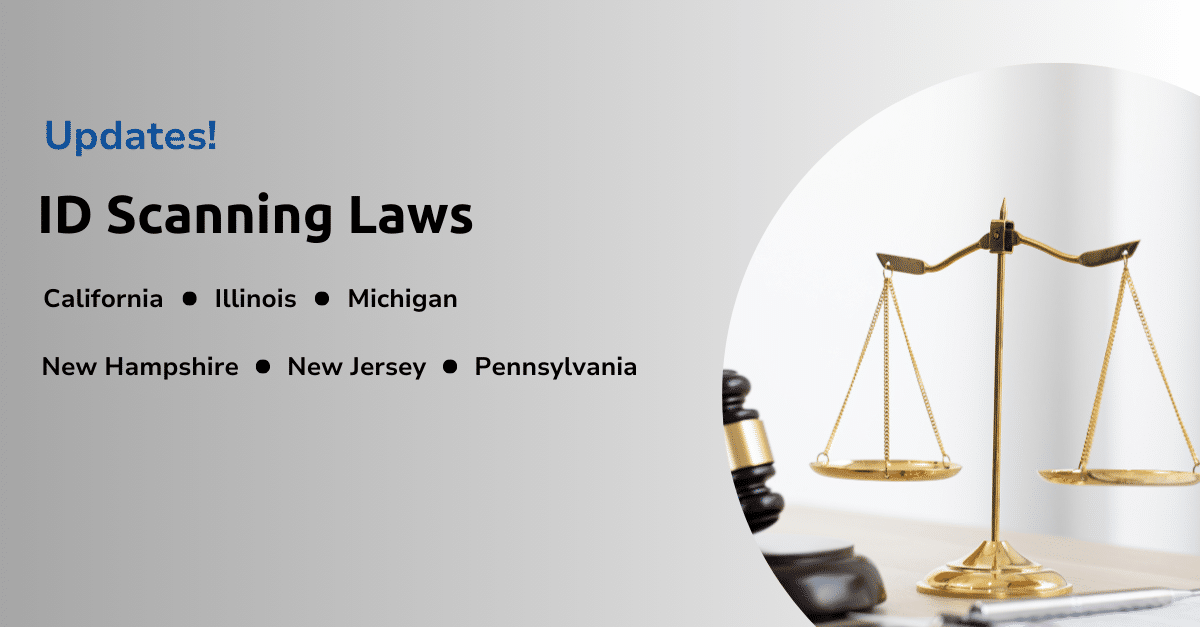
ID scanning laws by state
Your resource for state and federal legislation on ID scanning & identity verification.
ID scanning laws and regulations for US states
Click on the states below to view state-specific legislation related to scanning IDs, identity verification, and biometrics.
What types of ID scanning laws does IDScan.net track
Below are a few of the subjects we track to help keep our ID Laws database up to date.
Age verification laws
We track the age verification standards for sale of alcohol, tobacco, cannabis, firearms, eCigarettes, and more.
Age verification laws for eCommerce purchases
We track updates to regulations for websites and eCommerce platforms who may distribute age restricted products.
ID scanning legality
We monitor which states allow for digital ID scanning and which disallow it, and any changes in state policy.
PII from a scanned ID
Some states restrict which data can be stored from a scanned ID. We keep track of any changes to your ability to save a particular data field.
Acceptable PII uses
Most states have guardrails around how PII may be used (credit check, identity verification, etc.) and by whom.
PII retention thresholds
We track all laws related to the length of time a business must retain (or must delete) any saved data.
Consent & waivers
We track requirements related to consent agreements and instances where an individual may need to opt-in before their ID is scanned.
Facial recognition
We track any changes to laws related to facial recognition or usage/storage of biometric information.

ID laws
ID scanning as an affirmative defense
ID scanning can help your business stay compliant and avoid costly fines and penalties. It is a major motivation for many businesses.
What is affirmative defense for ID scanning?
Affirmative defense means that a business is off the hook if they perform a specific action. In the case of ID scanning (“electronic scanning” or “digital ID scanning”) state law releases businesses from liability if they are using an ID scanner. This means that the business cannot be sued or responsible for legal damages if they unknowingly sell age restricted products to a minor.
Which states have affirmative defense for ID scanning?
As of December 2022, the following states have affirmative defense for ID scanning for some or all types of age restricted purchases.
What are the requirements for taking advantage of affirmative defense for ID scanning?
Each state may (or may not) outline their definitions of “digital ID scanning” or “electronic scanning.” There are no system or technology requirements which must be specifically met to qualify as digital scanning, but typically electronically scanning the ID’s barcode is required.

ID scanning laws
Why track ID scanning & identity verification laws
There are many great reasons to track laws and legislation related to ID scanning.
Some states release businesses from the liability of selling alcohol or tobacco to a minor if they perform digital ID scanning.
Some states require that customers be notified before their ID is scanned. Requirements for this waiver or notification vary by jurisdiction.
Many states have laws governing which PII from a scanned ID can be stored, for how long, and for what purpose.
ID scanning laws FAQ
Which states can you not scan IDs?
Currently New Hampshire is the only state in which IDs may not be scanned for any reason.
As of 2023, Maryland has pending (but stalled) legislation that would restrict or limit a business’s right to scan IDs.
When is ID scanning recommended?
Many states require that businesses photocopy an ID, or record all ID information for transactions such as sale of secondhand goods (pawn), sale of precursor products, and notarial services (among others). ID scanning can greatly streamline these types of transactions by immediately capturing all ID data and a photo of the ID.
Do I have to inform customers that their ID is being scanned?
Consent laws vary by state. You likely need to add a consent or notification waiver before using their biometric information (facial template, fingerprint, etc.) but typically do not need to inform them before you scan their ID. Check your state’s regulations to confirm.
Which states allow a digital drivers license?
As of October 2023, the following states have announced plans to launch a mobile drivers license:
California, Connecticut, Kentucky, Hawaii, Indiana, New York, North Carolina, Ohio, Pennsylvania, and Virginia as well as Washington D.C. and Puerto Rico.
How long can data from a scanned ID be retained?
PII retention time frames very by state and sometimes by industry. You will need to fully read the ID laws for your states to determine how long you must retain data from a scanned ID.
Are there states which require ID scanning?
Several states require ID scanning in particular instances. Nevada and several other states require electronic scanning before the sale of cannabis products. Utah requires ID scanning (and creation of audit logs) before alcohol can be sold. Many more states have these types of laws under consideration.
Types of ID scanning laws by state
We track all 50 U.S. states and Washington D.C. on a quarterly basis, to ensure you always have the most up-to-date information about current and pending legislation in every jurisdiction.
| Affirmative defense | Controlled substance | Scrap metal | Tobacco sales | Alcohol sales | |
|---|---|---|---|---|---|
| Alabama | ✓ | ||||
| Alaska | |||||
| Arizona | ✓ | ✓ | ✓ | ✓ | |
| Arkansas | |||||
| California | |||||
| Colorado | ✓ | ||||
| Connecticut | ✓ | ✓ | ✓ | ✓ | |
| Delaware | |||||
| Florida | |||||
| Georgia | ✓ | ✓ | |||
| Hawaii | ✓ | ||||
| Idaho | ✓ | ✓ | ✓ | ||
| Illinois | ✓ | ||||
| Indiana | ✓ | ✓ | ✓ | ||
| Iowa | ✓ | ✓ | |||
| Kansas | ✓ | ✓ | ✓ | ||
| Kentucky | ✓ | ||||
| Louisiana | ✓ | ✓ | ✓ | ||
| Maine | ✓ | ✓ | ✓ | ||
| Maryland | ✓ | ||||
| Massachusetts | ✓ | ||||
| Michigan | ✓ | ✓ | ✓ | ✓ | |
| Minnesota | ✓ | ✓ | |||
| Mississippi | ✓ | ✓ | |||
| Missouri | ✓ | ✓ | |||
| Montana | ✓ | ✓ | ✓ | ||
| Nebraska | ✓ | ||||
| Nevada | ✓ | ✓ | ✓ | ✓ | |
| New Hampshire | |||||
| New Jersey | ✓ | ||||
| New Mexico | |||||
| New York | ✓ | ✓ | ✓ | ||
| North Carolina | ✓ | ✓ | ✓ | ✓ | |
| North Dakota | ✓ | ||||
| Ohio | ✓ | ✓ | ✓ | ✓ | |
| Oklahoma | ✓ | ✓ | ✓ | ✓ | |
| Oregon | ✓ | ✓ | ✓ | ||
| Pennsylvania | ✓ | ✓ | ✓ | ||
| Puerto Rico | |||||
| Rhode Island | ✓ | ✓ | ✓ | ||
| South Carolina | ✓ | ✓ | ✓ | ||
| South Dakota | ✓ | ||||
| Tennessee | ✓ | ✓ | ✓ | ||
| Texas | ✓ | ✓ | ✓ | ||
| Utah | ✓ | ✓ | ✓ | ✓ | |
| Vermont | ✓ | ✓ | ✓ | ||
| Virginia | ✓ | ✓ | ✓ | ||
| Washington | ✓ | ||||
| West Virginia | ✓ | ✓ | |||
| Wisconsin | ✓ | ✓ | |||
| Wyoming | ✓ | ✓ | |||
| Washington D.C. | ✓ | ✓ |
Please note that IDScan.net is not a legal organizations, nor should anything on this page constitute legal guidance. It is meant to be a list of resources and helpful links. Please consult your attorney before making any decisions related to scanning IDs in your state.




